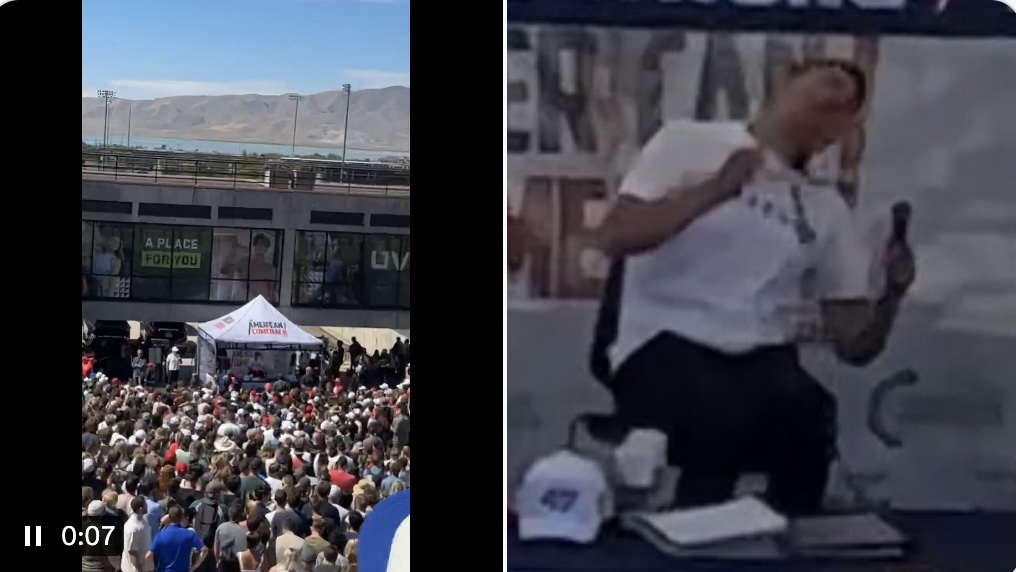Charles “Charlie” James Kirk (born October 14, 1993 – died September 10, 2025) was an American conservative activist, author, and media personality who helped reshape youth politics over the past decade. His trajectory from teenage political interest in Illinois to leading one of the country’s largest youth conservative organizations is marked by ambition, controversy, fervent support, and, ultimately, tragedy. Here is the story of his rise, his influence, and the event that ended his life.
Early Years and Rise to Prominence
- Kirk grew up in the Chicago suburban areas of Arlington Heights and Prospect Heights, Illinois. He first got involved in politics as a high school student, backing Republican campaigns and absorbing the conservative ideas that would become central to his later work. Wikipedia
- He briefly attended Harper College but dropped out to devote himself full-time to political activism. In 2012, at age 18 or 19, he co-founded Turning Point USA (TPUSA) along with William Montgomery. The organization’s mission was to promote conservative values — limited government, free markets, fiscal responsibility — particularly among high school and college students. Wikipedia+2Wikipedia+2
What He Built: Organizations, Media, Influence
- TPUSA became well-known for its work on college campuses. It developed initiatives like the Professor Watchlist and School Board Watchlist, lists intended to identify professors or school board members who expressed liberal or progressive views that TPUSA saw as out of line with conservative values. These moves drew very strong criticism from opponents who argued they amounted to silencing dissent or academic intimidation. Wikipedia+1
- In addition, in 2019 Kirk founded Turning Point Action (TPAction), its political advocacy arm. This allowed Kirk to move beyond student organizing and into more direct political mobilization and voter engagement. Wikipedia+1
- As a media figure, Kirk hosted The Charlie Kirk Show, a conservative radio/podcast program, and became a recognizable face in debates, rallies, and on social media. His content often focused on culture war issues: free speech on campuses, immigration, traditional family values, opposition to liberal policies. Wikipedia+1
- He was also allied with Donald Trump. TPUSA supported Trump in his campaigns; Kirk was a vocal supporter and influencer within the MAGA movement. His ideas and activism were often in conversation (and sometimes confrontation) with mainstream conservative politics, pushing for more populist, nationalist, and socially conservative stances. Wikipedia+2Reuters+2
Beliefs, Controversies, and Criticism
- Kirk embraced Christian conservative ideology more openly over time. He participated in religiously-oriented political movements, including founding Turning Point Faith, and advocated for what many characterize as Christian nationalism. Critics charged that some of his rhetoric blurred the lines between religion and state. Wikipedia+2Wikipedia+2
- He was frequently involved in controversies. Opponents accused him of promoting misinformation, false election fraud claims, provocative statements about gender and race, criticism of civil rights laws, and pushing culture war conflicts. These stances made him a polarizing figure—admired by many on the right, criticized heavily by many on the left. Wikipedia+1
Personal Life
- In May 2021, Charlie Kirk married Erika Frantzve, a businesswoman, podcaster, and former Miss Arizona USA. Wikipedia+1
- They had two children together: a daughter born in August 2022, and a son born in May 2024. People.com+1
Final Tour, Tragic Event, and Legacy
- In September 2025, Kirk was on a nationwide speaking tour through college campuses called “The American Comeback Tour”. One of the features of the tour was his “Prove Me Wrong” tables—public debates where he invites students to engage with him on controversial issues. People.com+3CBS News+3Wikipedia+3
- On September 10, 2025, at Utah Valley University in Orem, Utah, he was speaking at one of these events. A shot was fired from a nearby building during the event; Kirk was struck and died. This incident has been described by many as a political assassination given the setting, his high profile, and the nature of the event. People.com+3People.com+3Reuters+3
- His death triggered a strong response from across the political spectrum. Figures from both Republican and Democratic parties condemned the violence. The FBI and state authorities are investigating. Meanwhile, discussions have arisen about political polarization, the safety of public figures, and how to handle freedom of speech and open debate. Reuters+3CBS News+3People.com+3
Why Charlie Kirk Mattered
- Kirk managed to build a bridge between activism, media, and youth politics in a way few had. He tapped into issues that resonated with a generation feeling distrustful of elites, wanting patriotic identity, concerned about cultural change. Even people who strongly disagreed with him often felt he pushed them to think harder about culture, politics, free speech.
- Whether celebrated or condemned, his influence on conservative political strategy — especially with young Americans — was real. His methods (campus organizing, social media virality, public debates) are now part of mainstream political playbooks.
- His death is likely to become part of his legacy — both in how he is remembered by supporters, and in broader debates about political discourse and violence in the United States.
Conclusion
Charlie Kirk’s life was emblematic of the volatile, deeply polarized era in which he lived. He rose fast, built powerful platforms, mobilized many, courted controversy, and was unafraid to confront opposition. His tragic death strikes at the core of ongoing questions: How do we balance free speech with public safety? What does it mean to engage civilly across deep political divides? And how should society respond when someone who invites debate is silenced by violence?
For supporters, he will be remembered as a steadfast champion of conservative youth, someone who refused to back down. For critics, his career underscores the risks of aggressive political rhetoric and polarized identity politics. Either way, Charlie Kirk left a mark, and his story reminds us that in modern politics, the battles are not just over policy—but over identity, voice, and whether debate itself can survive.
